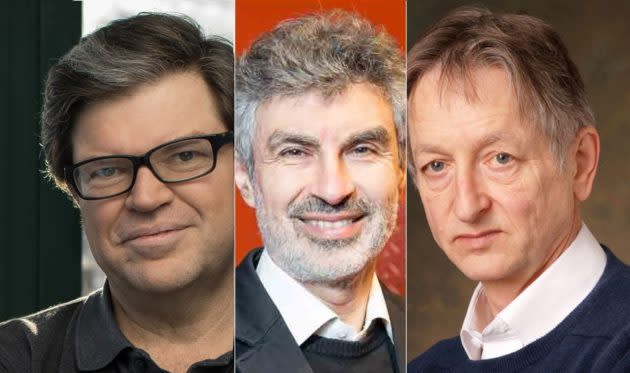Turing Award honors a different kind of AI network with ‘Nobel Prize of computing’

The three recipients of the Association for Computing Machinery’s 2018 Turing Award, known as the “Nobel Prize of computing,” are sharing the $1 million award for their pioneering work with artificial neural networks — but that’s not all they share.
Throughout their careers, the researchers’ career paths and spheres of influence in the field of artificial intelligence have crossed repeatedly.
Yann LeCun, vice president and chief AI scientist at Facebook, conducted postdoctoral research under the supervision of Geoffrey Hinton, who is now a vice president and engineering fellow at Google. LeCun also worked at Bell Labs in the early 1990s with Yoshua Bengio, who is now a professor at the University of Montreal and an adviser for Microsoft’s AI initiative.
All three also participate in the Learning in Machines and Brains program sponsored by CIFAR, previously known as the Canadian Institute for Advanced Research.
In Wednesday’s award announcement, ACM credited the trio with rekindling the AI community’s interest in deep neural networks — thus laying the groundwork for today’s rapid advances in machine learning.
“Artificial intelligence is now one of the fastest-growing areas in all of science, and one of the most-talked-about topics in society,” said ACM President Cherri Pancake, a professor emeritus of computer science at Oregon State University. “The growth of and interest in AI is due, in no small part, to the recent advances in deep learning for which Bengio, Hinton and LeCun laid the foundation.”
And you don’t need to work in a lab to feel their impact.
“Anyone who has a smartphone in their pocket can tangibly experience advances in natural language processing and computer vision that were not possible just 10 years ago,” Pancake said.
ACM called the three awardees the “Fathers of the Deep Learning Revolution.”
The current approach to machine learning, championed by Hinton starting in the early 1980s, shies away from telling a computer explicitly how to solve a given task, such as object classification. Instead, the software uses an algorithm to analyze the patterns in a data set, and then apply that algorithm to classify new data. Through repeated rounds of learning, the algorithm becomes increasingly accurate.
Hinton, LeCun and Bengio focused on developing neural networks to facilitate that learning. Such networks are composed of relatively simple software elements that are interconnected and weighted in ways inspired by the connections between neurons in the human brain. Fine-tuning the connections helps programmers build deep learning networks, with layers upon layers of artificial neurons.
All three continue to play leading roles in AI research:
In addition to his work with the Google Brain team and CIFAR, Geoffrey Hinton is chief scientific adviser at Canada’s Vector Institute for Artificial Intelligence and a university professor emeritus at the University of Toronto.
In his role as vice president and chief AI scientist at Facebook, LeCun built up the social-media platform’s network of AI research labs — including its recently established Seattle lab. He’s also a professor at New York University’s Courant Institute of Mathematical Sciences.
Yoshua Bengio is a computer science professor at the University of Montreal and the scientific director of Mila, Quebec’s AI institute, as well as the Institute for Data Valorization, or IVADO. He and LeCun are co-directors of CIFAR’s Learning in Machines and Brains program. Bengio’s connection to Microsoft dates back to the company’s acquisition of a Montreal-based AI startup called Maluuba in 2017. Bengio was an adviser to Maluuba, and took on that role for Microsoft after Maluuba was acquired.
Previous Turing Awards have gone to the likes of Tim Berners-Lee, the creator of the World Wide Web; and Vinton Cerf and Bob Kahn, who are reckoned among the internet’s founding researchers. Oren Etzioni, CEO of Seattle’s Allen Institute for Artificial Intelligence, argued that this year’s Turing Award could also be seen as “nothing short of historic, because it underscores a paradigm shift in AI.”
“Today, in vision, natural language processing and machine learning research, it’s essentially ‘all deep learning, all the time,’ and the Turing Awards winners pioneered this paradigm,” Etzioni told GeekWire in an email. “Looking to the future, deep learning has benefited immensely from Moore’s Law, but that exponential is finally slowing down — what will happen over the next decades?”
